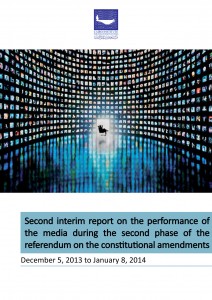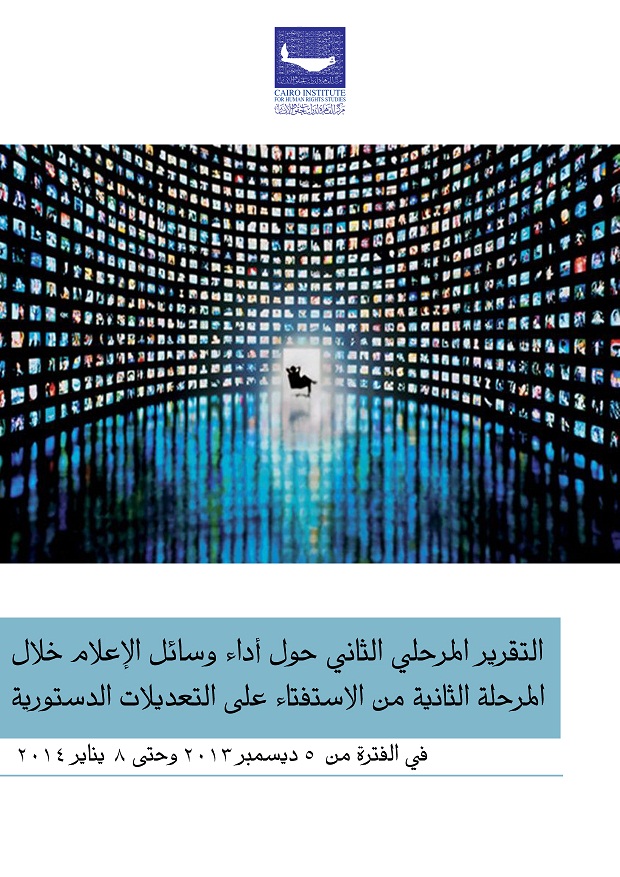 On Tuesday, January 14, 2014, the Cairo Institute for Human Rights Studies issued its second interim report on the performance of 20 media outlets during coverage of the referendum on the constitution from December 5 to January 8.
On Tuesday, January 14, 2014, the Cairo Institute for Human Rights Studies issued its second interim report on the performance of 20 media outlets during coverage of the referendum on the constitution from December 5 to January 8.
The report, the second in a series of media monitoring of the referendum, evaluates the media’s performance during the referendum campaign and public debate using international standards of media performance. Daily monitoring activities have revealed that the media has deliberately failed to play its proper role. The report summarizes the media’s failings in nine detailed points, most significantly the decline in content devoted to educating voters coupled with a focus on mobilizing support for the constitutional amendments. The absence of any debate on the amendments or a serious, objective discussion of the topic that would help citizens to make their decision without propaganda or emotional appeals is damaging to the integrity of the process and occasionally unprofessional.
The report examines the political and media context of the public debate on the constitution, criticizing the lack of media diversity after the closure of religious television channels and the suspension of the Freedom and Justice Party’s newspaper. As a result, the media became a one-note mobilization campaign, with the only dissonant note offered by al-Jazeera Mubasher Egypt. Nevertheless, the latter has also failed to provide professional impartial coverage of the referendum process.
The report notes the intimidation of citizens participating in the referendum. It also criticizes the media for stoking hatred towards members of the Muslim Brotherhood and overexposure of terrorist acts in order to mobilize support for the constitution, which is portrayed as the sole means of ending terrorism.
The report also criticizes the media for infringing on its audience’s right to differ with its editorial policies and depriving citizens of the diversity and balance that ensure citizens can freely choose. Instead, the media has stigmatized those who hold opinions that differ from its own. The report stresses that this is true of media that support and oppose the constitutional amendments, as pro- and anti-constitution outlets both used the same tactics to smear dissidents and confiscate their right to expression their opinion.
The report focuses on state-owned media insofar as it is charged with giving voice to all segments of society and airing differing opinions. It notes that state-owned media have an extra responsibility to avoid censoring opinions, propaganda, or infringing on the rights of the audience.
The CIHRS cautions that media coverage based on mobilization and indoctrination, in the absence of any debate, discussion, or explanation, may have negative consequences and ultimately be self-defeating, giving media consumers the sense that the results are already decided and that their participation is superfluous. Similarly, it may raise suspicions that the media’s failure to discuss controversial articles or give space to divergent views is a result of collusion between the media and other bodies.
Some Citizens may also feel that the media, particularly the state-owned media, does not represent them and is completely divorced from their beliefs and ideas. Some citizens may feel that media figures who should serve the public are instead vying to confiscate their opinion and accuse them of treason and lack of patriotism simply because they hold a view at odds with the majority. Finally, this type of propagandistic coverage, which lacks all professional standards and principles, reinforces the gaps between the audience and the media and, in turn, their distance from public policy. This undermines political participation based on informed positions and encourages all parties to use emotional and religious appeals and material incentives to counter-mobilize.
The report discusses the findings of the daily monitoring of 20 media outlets, including seven newspapers (al-Ahram, al-Gomhouriya, al-Wafd, al-Hurriya wa al-Adala, al-Masry al-Youm, al-Shorouk, and al-Watan) eight television channels (the Egyptian Satellite Channel, Nile News, ONTV, CBC, al-Hayat, al-Nahar, MBC Egypt, and al-Jazeera Egypt); and five radio stations (Radio Egypt, 90:90, Hits Radio, Nugoum FM, and Quran Radio).
For the full report in English, press here.
Share this Post

